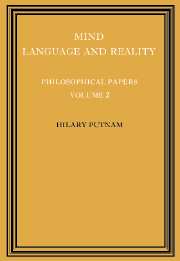Book contents
- Frontmatter
- Contents
- Dedication
- Introduction
- 1 Language and philosophy
- 2 The analytic and the synthetic
- 3 Do true assertions correspond to reality?
- 4 Some issues in the theory of grammar
- 5 The ‘innateness hypothesis’ and explanatory models in linguistics
- 6 How not to talk about meaning
- 7 Review ofThe concept of a person
- 8 Is semantics possible?
- 9 The refutation of conventionalism
- 10 Reply to Gerald Massey
- 11 Explanation and reference
- 12 The meaning of ‘meaning’
- 13 Language and reality
- 14 Philosophy and our mental life
- 15 Dreaming and ‘depth grammar’
- 16 Brains and behavior
- 17 Other minds
- 18 Minds and machines
- 19 Robots: machines or artificially created life?
- 20 The mental life of some machines
- 21 The nature of mental states
- 22 Logical positivism and the philosophy of mind
- Bibliography
- Index
15 - Dreaming and ‘depth grammar’
Published online by Cambridge University Press: 12 January 2010
- Frontmatter
- Contents
- Dedication
- Introduction
- 1 Language and philosophy
- 2 The analytic and the synthetic
- 3 Do true assertions correspond to reality?
- 4 Some issues in the theory of grammar
- 5 The ‘innateness hypothesis’ and explanatory models in linguistics
- 6 How not to talk about meaning
- 7 Review ofThe concept of a person
- 8 Is semantics possible?
- 9 The refutation of conventionalism
- 10 Reply to Gerald Massey
- 11 Explanation and reference
- 12 The meaning of ‘meaning’
- 13 Language and reality
- 14 Philosophy and our mental life
- 15 Dreaming and ‘depth grammar’
- 16 Brains and behavior
- 17 Other minds
- 18 Minds and machines
- 19 Robots: machines or artificially created life?
- 20 The mental life of some machines
- 21 The nature of mental states
- 22 Logical positivism and the philosophy of mind
- Bibliography
- Index
Summary
Introduction
1. In this paper I wish to examine certain general doctrines having to do with language which are employed by Norman Malcolm in his book Dreaming (Malcolm, 1959). I say ‘employed’, not ‘stated’, because Malcolm never does fully state these doctrines. Yet his arguments turn not on the linguistic properties of individual words, but on these almost formal principles, involving such notions as ‘concept’, ‘sense’, ‘logical independence’, ‘stipulation’, ‘giving a use’, ‘being unverifiable in principle’, ‘criterion’, ‘indication’ and ‘inference’.
His arguments are also of interest in that they can be read as simple versions of some famous arguments of Wittgenstein's as he is interpreted by Malcolm. If this interpretation of Malcolm's is faithful to what Wittgenstein had in mind, then these famous arguments are bad arguments and prove nothing. But this relation to Wittgenstein's philosophy may, in the present years, be a further reason for finding Malcolm's book interesting to discuss.
2. The following quotations will serve to indicate the flavor of the relevant parts of Malcolm's book:
(i) There are two concepts of sleep, because there are two methods of verification: ‘With adults and older children there are two criteria of behaviour and testimony; with animals and human infants there is only the one criterion of behaviour. The concept of sleep is not exactly the same in the two cases’ (p. 23).
(ii) ‘Asleep’ applied to a sleep-walker is a ‘new use’: ‘To say that a man who is walking is “asleep”, is a new use of the expression’ (p. 27).
[…]
- Type
- Chapter
- Information
- Philosophical Papers , pp. 304 - 324Publisher: Cambridge University PressPrint publication year: 1975
- 10
- Cited by



